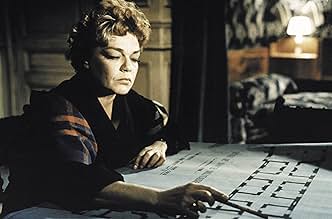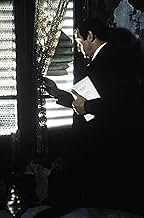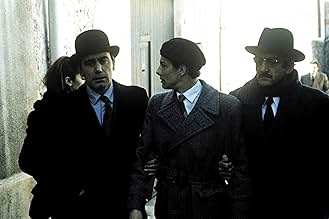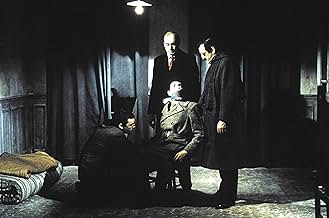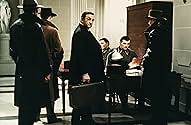AVALIAÇÃO DA IMDb
8,1/10
28 mil
SUA AVALIAÇÃO
Um relato sobre combatentes clandestinos da resistência na França ocupada pelos nazistas.Um relato sobre combatentes clandestinos da resistência na França ocupada pelos nazistas.Um relato sobre combatentes clandestinos da resistência na França ocupada pelos nazistas.
- Direção
- Roteiristas
- Artistas
- Prêmios
- 4 vitórias e 1 indicação no total
- Direção
- Roteiristas
- Elenco e equipe completos
- Produção, bilheteria e muito mais no IMDbPro
Avaliações em destaque
Never before (and after) a movie on French Resistance has been so "glamourless". Jean-Pierre Melville has been hailed as the father of the French gangster film. Certainly, his gangster films are probably the films for which he is best known (Le Doulos, Deuxieme Soufflé, Le Samourai, Le cercle rouge, Bob le flambeur) on par if not better than anything which Hollywood produced. Yet the world of the anonymous gun-toting hoodlum occupies only a part of his oeuvre.
'L'armee des ombres' (aka The Shadow Army) is Jean Pierre Melville 1969 masterpiece and does not deal with gangsters. The film is a mix of the director's war time experiences in the French Resistance and Joseph Kessel successful wartime novel. What is remarkable about this film is that Melville turned a mosaic of anecdotes that Kessel's novel is all about into a great, dark epic.
From the chilling opening shot of Germans marching down the Champs-Elysées to the final scene involving the fellow Resistant Mathilde (the great Simone Signoret) the film seems to demonstrate that fighting for an ideal often leads towards death and solitude. What Melville does successfully is to show those dead-ends the way they occur to their protagonist (very simply and minimalist), however more than showing them Mr. Melville managed to make these realities (death and solitude) an equally tragic experienced for the audience...
'L'armee des ombres' is Melville's most moving film, a monument to the spirit of the Resistance rather than its actuality. A poignant drama with a strong performance from not only Lino Ventura but also Simone Signoret, Paul Meurisse, Jean Pierre Cassel, Claude Mann, Paul Crauchet to name a few.
This is probably Melville's greatest cinematographic achievement and, when fiction becomes reality, when actors leave behind their egos to resurrect into heroes, when the colors of the film mirror the one of the soul and when silence becomes music, true cinema has been achieved 'L'armee des ombres' is a terrible yet powerful experience in which the words duty, courage, abnegation get charged with meaning
'L'armee des ombres' (aka The Shadow Army) is Jean Pierre Melville 1969 masterpiece and does not deal with gangsters. The film is a mix of the director's war time experiences in the French Resistance and Joseph Kessel successful wartime novel. What is remarkable about this film is that Melville turned a mosaic of anecdotes that Kessel's novel is all about into a great, dark epic.
From the chilling opening shot of Germans marching down the Champs-Elysées to the final scene involving the fellow Resistant Mathilde (the great Simone Signoret) the film seems to demonstrate that fighting for an ideal often leads towards death and solitude. What Melville does successfully is to show those dead-ends the way they occur to their protagonist (very simply and minimalist), however more than showing them Mr. Melville managed to make these realities (death and solitude) an equally tragic experienced for the audience...
'L'armee des ombres' is Melville's most moving film, a monument to the spirit of the Resistance rather than its actuality. A poignant drama with a strong performance from not only Lino Ventura but also Simone Signoret, Paul Meurisse, Jean Pierre Cassel, Claude Mann, Paul Crauchet to name a few.
This is probably Melville's greatest cinematographic achievement and, when fiction becomes reality, when actors leave behind their egos to resurrect into heroes, when the colors of the film mirror the one of the soul and when silence becomes music, true cinema has been achieved 'L'armee des ombres' is a terrible yet powerful experience in which the words duty, courage, abnegation get charged with meaning
This is probably one of the best fiction movies ever made on the French resistance during Worl War II. Far from the usual romantic cliches showing handsome young men playing tricks with the Nazis and falling in love with sublime women, the substance of the movie is reality. It depicts a "shadow army" made of courageous men who are ready to sacrifice their lives but are aware of the huge cost they will eventually have to pay. It shows the cruel and sometimes inhuman choices they have to make in order to survive. This is a very useful movie that gives a real hint of what resistance truly was.
"L'Armée des ombres" (1969) was shown in the U.S as "Army of Shadows." The film is co-written and directed by Jean-Pierre Melville.
The time is 1942 and the setting is France. Lino Ventura plays Philippe Gerbier, a high-ranking officer in the French resistance. Gerbier is intelligent, resourceful, and brave. He and his small band of urban fighters are constantly in danger of capture and torture by the Nazis. This isn't a film of rural partisans--it's a film where people meet in cafés and offices. No one knows when Nazi soldiers or Gestapo will sweep down and drag them off. No meeting is safe, and no relationship is safe either--how many people can remain silent under savage tortures that go on for days?
Although Ventura is excellent in the role, the movie is dominated by Simone Signoret as Mathilde--tougher and braver than any of the men, but possessing one terrible weakness.
This movie is different than most films about the French Resistance. Things don't go smoothly, they don't go well, fear is everywhere, and heroism often takes place in a prison cell where no one ever learns of it. It's fascinating, but grim.
"Army of Shadows" is a neglected film by a great director. It's definitely worth seeking out.
The time is 1942 and the setting is France. Lino Ventura plays Philippe Gerbier, a high-ranking officer in the French resistance. Gerbier is intelligent, resourceful, and brave. He and his small band of urban fighters are constantly in danger of capture and torture by the Nazis. This isn't a film of rural partisans--it's a film where people meet in cafés and offices. No one knows when Nazi soldiers or Gestapo will sweep down and drag them off. No meeting is safe, and no relationship is safe either--how many people can remain silent under savage tortures that go on for days?
Although Ventura is excellent in the role, the movie is dominated by Simone Signoret as Mathilde--tougher and braver than any of the men, but possessing one terrible weakness.
This movie is different than most films about the French Resistance. Things don't go smoothly, they don't go well, fear is everywhere, and heroism often takes place in a prison cell where no one ever learns of it. It's fascinating, but grim.
"Army of Shadows" is a neglected film by a great director. It's definitely worth seeking out.
This is a film about real heroes. Not the flashy Rambo kind, but ordinary men and women who did extraordinary things in a time when France had already surrendered to the Germans. They only numbered a few hundred at most, and they walked in the shadows around France knowing that they would certainly die before it was over. Yet, they moved on and did what they had to without complaint or regret.
You won't see bombs blazing and blood and gore. What you will see is real people who agonize over every death that they are forced to carry out. People who knew that every corner held danger and that they could be betrayed at any time.
These are real heroes and this film portrays them as they were in a somber, intelligent, and dark fashion. The film was made and released in 1969, yet it's awards are in 2006 and 2007, when it was restored and finally presented in this country.
As the films of Jean-Pierre Melville are made available, we are able to share in seeing one of the truly great directors in the world. The pleasure is immeasurable.
You won't see bombs blazing and blood and gore. What you will see is real people who agonize over every death that they are forced to carry out. People who knew that every corner held danger and that they could be betrayed at any time.
These are real heroes and this film portrays them as they were in a somber, intelligent, and dark fashion. The film was made and released in 1969, yet it's awards are in 2006 and 2007, when it was restored and finally presented in this country.
As the films of Jean-Pierre Melville are made available, we are able to share in seeing one of the truly great directors in the world. The pleasure is immeasurable.
If you have any interest whatsoever in French cinema, World War II, moral ambiguity, or Simone Signoret, see this film.
Filmed in a cold, documentary-like style, the "Shadow Army" tells the intertwining stories of several members of the French resistance. The movie defies any sort of simple categorization. It is a thriller without being thrilling. It is a spy story without a single gadget. It portrays the tedium of the task without being boring. Finally, it tells a story of heroic courage without the benefit of a single hero. That last point isn't immediately evident and you are free to disagree, of course, but heroes (as defined in the usual movie terms) are hard to come by in this story.
A popular adage goes; one person's terrorist is another person's freedom fighter. This movie serves up proof to that lie. There are true freedom fighters that will never be labeled "terrorist" and you will meet them during the course of this film. The movie makes clear that they, and the ones around them, paid a high price in pursuit of freedom. Not just in life and limb, but in moral conviction. As the movie unfolds, I found myself asking, is this action justified? The answer, of course, is that it most certainly is. The better question is would I, or anyone I know, have the courage to do what had to be done.
The technical aspects of the film are all first rate even though a bit below the best of European cinema at the time. (In some ways, the lack of high definition color and sets give it a feel much more in keeping with the time it portrays.) The actors disappear into their roles and there is not a star-turn to be found.
According to the announcement made before the screening I attended, it is being released in the United States on May 12, 2006, just before the summer blockbuster crush. Why that date and why now, almost 30 years after it was made, I do not know. My guess is it probably has something to do with money. (Doesn't it always?) Whatever the reasons, skip the Tom Cruise vehicle and don't miss the opportunity to see it.
Filmed in a cold, documentary-like style, the "Shadow Army" tells the intertwining stories of several members of the French resistance. The movie defies any sort of simple categorization. It is a thriller without being thrilling. It is a spy story without a single gadget. It portrays the tedium of the task without being boring. Finally, it tells a story of heroic courage without the benefit of a single hero. That last point isn't immediately evident and you are free to disagree, of course, but heroes (as defined in the usual movie terms) are hard to come by in this story.
A popular adage goes; one person's terrorist is another person's freedom fighter. This movie serves up proof to that lie. There are true freedom fighters that will never be labeled "terrorist" and you will meet them during the course of this film. The movie makes clear that they, and the ones around them, paid a high price in pursuit of freedom. Not just in life and limb, but in moral conviction. As the movie unfolds, I found myself asking, is this action justified? The answer, of course, is that it most certainly is. The better question is would I, or anyone I know, have the courage to do what had to be done.
The technical aspects of the film are all first rate even though a bit below the best of European cinema at the time. (In some ways, the lack of high definition color and sets give it a feel much more in keeping with the time it portrays.) The actors disappear into their roles and there is not a star-turn to be found.
According to the announcement made before the screening I attended, it is being released in the United States on May 12, 2006, just before the summer blockbuster crush. Why that date and why now, almost 30 years after it was made, I do not know. My guess is it probably has something to do with money. (Doesn't it always?) Whatever the reasons, skip the Tom Cruise vehicle and don't miss the opportunity to see it.
Você sabia?
- CuriosidadesCinematographer Pierre Lhomme claimed that the last surviving, watchable print of the movie had turned completely pink with age. He later supervised the 2k resolution, digital restoration of the film at the Eclair Laboratories in Paris.
- Erros de gravaçãoIn the London WWII sequence, double yellow lines are visible on the road. These were only introduced in the UK in 1956 and didn't become common until the 1960s; a few of the street signs have a style not known before the 1960s.
- Citações
Philippe Gerbier: See you, Comrade.
Legrain: You a communist?
Philippe Gerbier: No. But I do have comrades.
- ConexõesFeatured in Mémoires pour Simone (1986)
Principais escolhas
Faça login para avaliar e ver a lista de recomendações personalizadas
Detalhes
- Data de lançamento
- Países de origem
- Idiomas
- Também conhecido como
- El ejército de las sombras
- Locações de filme
- Bunker de l'armée, Saint-Cyr-l'Ecole, Yvelines, França(execution by the Gestapo)
- Empresas de produção
- Consulte mais créditos da empresa na IMDbPro
Bilheteria
- Faturamento bruto nos EUA e Canadá
- US$ 861.983
- Fim de semana de estreia nos EUA e Canadá
- US$ 12.620
- 30 de abr. de 2006
- Faturamento bruto mundial
- US$ 931.732
Contribua para esta página
Sugerir uma alteração ou adicionar conteúdo ausente





